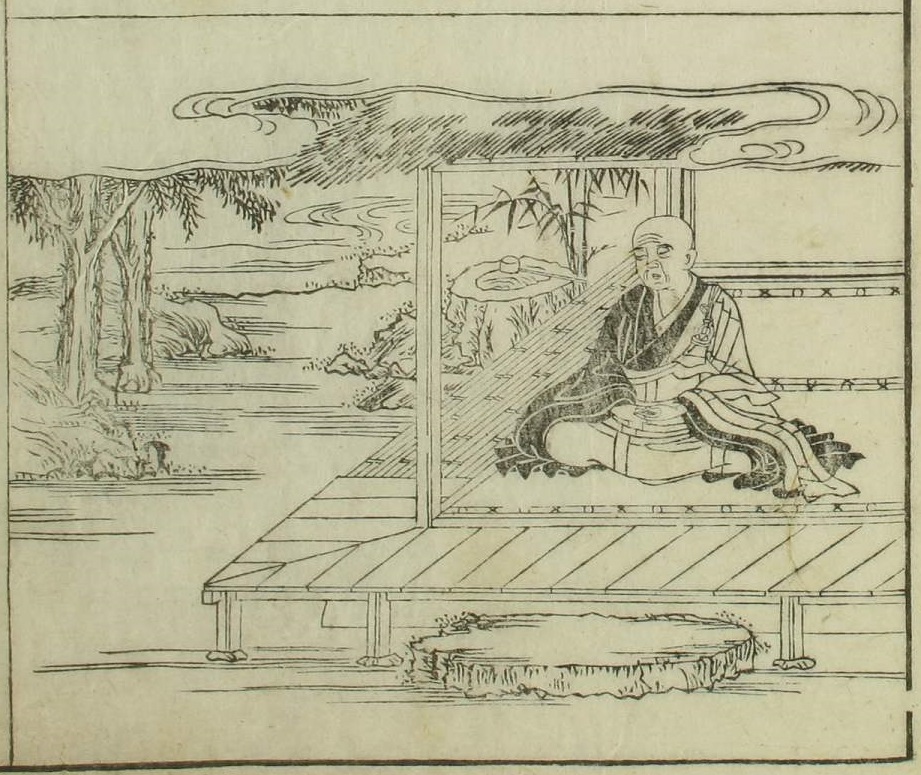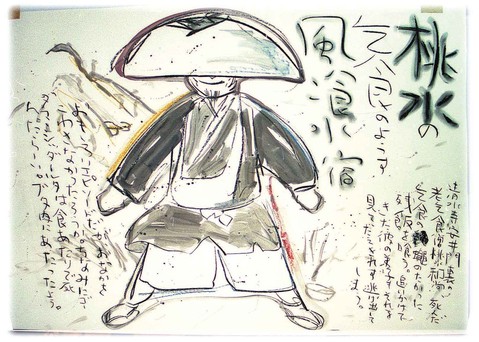ZEN MESTEREK ZEN MASTERS
« Zen főoldal
« vissza a Terebess Online nyitólapjára

桃水雲渓 Tōsui Unkei (1612-1683)
![]()
桃水和尚傳贊 Tōsui oshō densan
http://www.wul.waseda.ac.jp/kotenseki/html/ha04/ha04_02632/index.html
PDF: Letting Go: The Story of Zen Master Tōsui
Biography of Tōsui Unkei by
面山瑞方 Menzan Zuihō (1683-1769)
Translated with an Introduction by Peter Haskel
University of Hawai‘i Press, Honolulu, 2001
Dharma Lineage of Tōsui Unkei
[...]
永平道元 Eihei Dōgen (1200-1253)
孤雲懐奘 Koun Ejō (1198-1280)
徹通義介 Tettsū Gikai (1219-1309)
螢山紹瑾 Keizan Jōkin (1268-1325)
峨山韶碩 Gasan Jōseki (1275-1366)
通幻寂靈 Tsūgen Jakurei (1322-1391)
石屋真梁 Sekioku Shinryō (1345-1423)
竹居正猷 Chikkyo Shōyū (1380-1461)
器之為璠 Kishi Ihan (1404-1468)
大庵須益 Dai'an Su'eki (1406-1473)
全岩東純 Zengan Tōjun (?-1495)
足翁永滿 Soku'ō Eiman (1435-1505)
天甫存佐 Tenfu Zonsa (1449-1517)
奇伯瑞龐 Kihaku Zuibō (1463-1547)
大用宗俊 Daiyō Sōshun
一翁龐賢 Ichiō Hōken
文應全藝 Bun'ō Zengei
傳志麟的 Denshi Rinteki
圍巖宗鐵 Igan Shūtetsu
桃水雲渓 Tōsui Unkei (1612-1683)

Tōsui Unkei. Painting by 高根英博 Takane Hidehiro (1952-)
桃水雲渓 TOSUI UNKEI
in: JAPANESE DEATH POEMS
Written by Zen Monks and Haiku Poets on the Verge of Death
compiled with an Introduction and commentary by YOEL HOFFMANN
Rutland, Vermont, Charles E. Tuttle Publishing, 1986, 368 p.
Died on the nineteenth day of the ninth month, 1683 past the age of seventySeventy years and more
I have tasted life to its utmost.
The stench of urine sticks to my bones.
What matter all these?
Ho! Where is the place I return to?
Above the peak the moonlight whitens
A clear wind blows.Tosui, who was called by all "the holy beggar," entered a monastery at the age of seven. As an adolescent he often fasted and secluded himself. He refused to join any one sect and never stayed long in one place. In one of the monasteries where he spent several years, he found himself-- against his will-- teaching Zen. At the height of the teaching season he wrote the following words on the monastery gate before abandoning the place:
Today is the end of religion's work--
Go back, all of you, to your homes.
I leave before you,
Eastward or westward,
Wherever the wind might carry me.After wandering throughout Japan, Tosui joined the beggars of Kyoto and lived among them. One day one of his former pupils found him there. Tosui was dressed in rags, his hair growing wildly, and he carried a straw mat on his back. The pupil asked to join him, but Tosui rebuked him and tried to send him away. In spite of this the young monk put on begging clothes and followed his master. Tosui spoke not a word to him. In the town of Katata near Lake Biwa the two of them found the corpse of a beggar and buried it. When the pupil exclaimed, "Poor man," Tosui turned to him and scolded him: "Why pity the man? The most honored of men and the most wretched of beggars share a single fate- death." Tosui then sat to eat the rice porridge that the beggar had left, murmuring as he ate it, "Mm, good." Suddenly he turned to his pupil and ordered him, "Eat this!" As he had no choice but to obey, the pupil placed a small portion of the porridge in his mouth, but he was unable to swallow it and gagged it up again. "I warned you not to follow me," Tosui reproached him, and sent him away.
Thus it was that Tosui wandered from place to place, supporting himself by weaving straw boots to cover the legs of horses in winter and by carrying people on his back. For a while he lived in the city of Otsu (Shiga Prefecture) under a straw roof stretched over the space between two storehouses. At the same time, a certain stable hand, who considered Tosui a holy man, brought him a portrait of the Buddha Amida. On the picture Tosui wrote the following verse:
Though my dwelling be small
I take you in, Lord Amida--
But don't think for a minute
I need you for life after death.Tosui spent the last years of his life in Kyoto, living at first under a bridge and later in a half- demolished shack in the outskirts of the city. He died, sitting upright in a Zen position, his death poem lying beside his body.
![]()
TOSUI UNKEI
Meghalt 1683-ban, a kilencedik hónap 19. napján, több, mint 70 évesen.
Vers a halál mesgyéjéről
Fordította: Somogyvári Zsolt
Jisei, Farkas Lőrinc Imre Kiadó, 1994, 32. oldal
A fordítás alapjául szolgáló mű:
Yoel Hoffmann: Japanese Death Poems: Written by Zen Monks and Haiku Poets on the Verge of Death. Tuttle Publishing. 1986.
Hetven éven át és tovább
Végsőkig ízleltem az életet.
Vizeletem rossz szaga csontjaimra tapadt.
Mi a baj mindezzel?
Megállj! Hol az a hely, ahova visszatérek?
A hegycsúcs felett holdfény fehérlik,
Tiszta szél fúj.